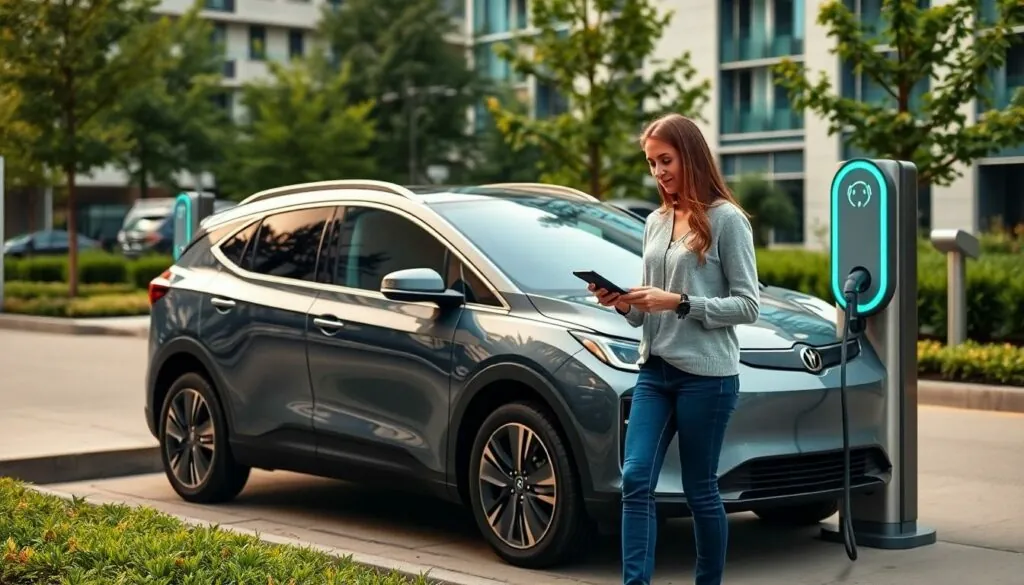Table of Contents
ToggleAs electric vehicles zoom into the future, smart charging is the unsung hero of the green revolution. Imagine a world where your car charges itself while you binge-watch your favorite shows or catch up on that never-ending to-do list. Sounds like a dream? It’s closer to reality than you think.
Smart charging isn’t just about convenience; it’s a game-changer for energy efficiency and cost savings. By optimizing when and how your vehicle charges, it helps balance the grid and keeps those pesky electricity bills in check. Plus, it’s like giving your EV a brain—one that knows when to sip energy and when to gulp it down. So, buckle up as we explore how smart charging can supercharge your driving experience and make you the envy of your neighborhood.
Overview of Smart Charging of Electric Vehicles
Smart charging of electric vehicles (EVs) refers to the intelligent management of energy consumption during the charging process. It employs advanced technologies to optimize the charging time and rate based on variables such as grid demand and energy prices. Enhanced communication between the vehicle, charging station, and grid ensures that EVs charge during off-peak hours, thus minimizing costs for users.
Benefits of smart charging extend beyond individual savings. By distributing loads effectively across the grid, smart charging helps prevent overloads during peak demand. This capability contributes to maintaining grid stability, essential for incorporating more renewable energy sources. Users enjoy the convenience of scheduling their charging sessions based on real-time pricing, ensuring increased efficiency.
Smart chargers, equipped with features such as demand response capabilities, adjust to fluctuations in energy availability. These chargers can also receive signals from utility providers prompting them to postpone charging until demand decreases. Technologies like vehicle-to-grid (V2G) allow EVs to not only draw power but also return energy to the grid, further enhancing grid resilience.
Data shows that smart charging can lead to up to 20% savings on energy costs for EV owners. Continuous improvements in smart charging technology will facilitate better integration of electric vehicles into the broader energy ecosystem. Users can expect a seamless experience as systems evolve to meet energy needs and environmental goals.
Adoption of smart charging strategies will play a key role in shaping the future of electric transportation. Coordinated efforts among manufacturers, utility companies, and policymakers support widespread implementation. As these ecosystems develop, the synergy between EVs and smart grids promises to enhance the overall experience for electric vehicle users.
Benefits of Smart Charging

Smart charging offers significant advantages for electric vehicle owners, enhancing both financial and environmental aspects.
Cost Savings
Energy costs often decrease with smart charging solutions. Owners can benefit from charging during off-peak hours when electricity rates are lower. Data shows potential savings of up to 20% on energy expenses through optimized charging. Smart chargers also adjust to dynamic pricing and grid demand, helping users avoid expensive peak rates. Further reductions arise when EVs participate in demand response programs, allowing them to save even more by responding to utility signals.
Environmental Impact
Smart charging plays a vital role in reducing carbon footprints. It promotes the use of renewable energy by syncing charging times with periods of high solar or wind energy generation. By encouraging off-peak charging, it effectively lowers the overall demand on the electrical grid. This shift decreases reliance on fossil fuels during peak times. Furthermore, technologies like vehicle-to-grid allow EVs to return power to the grid, thereby supporting energy sustainability efforts. The synergy of smart charging with renewable sources contributes to a more balanced, eco-friendly energy system.
Technologies Behind Smart Charging
Smart charging leverages various advanced technologies, enhancing the electric vehicle experience while improving grid efficiency.
Smart Grid Integration
Smart grid systems play a pivotal role in smart charging. They enable effective communication between electric vehicles and the electrical grid. With real-time data exchange, charging schedules can shift based on grid demand and energy availability. This proactive management helps balance load and reduces the risk of outages. Integrating smart grid technology enhances the overall efficiency of energy use, creating a more sustainable environment. Coordination between utilities and EV users optimizes benefits, ensuring cost-effective charging and maximizing the use of renewable energy.
Vehicle-to-Grid Systems
Vehicle-to-grid systems showcase the potential of smart charging technologies. These systems allow electric vehicles to not only draw energy from the grid but also supply energy back when necessary. By returning stored energy, EVs support grid stability and efficiency. This bidirectional flow of energy contributes to resilience, especially during peak demand periods. Significantly, data indicates that vehicle-to-grid systems can facilitate substantial savings while promoting the use of renewable sources. Implementing these systems encourages a more balanced energy ecosystem, benefiting both EV owners and the wider community.
Challenges in Implementation
Implementing smart charging for electric vehicles presents several challenges. Addressing these obstacles requires strategic solutions and industry collaboration.
Infrastructure Limitations
Limited existing infrastructure poses a significant barrier to widespread smart charging adoption. Many charging stations currently lack the necessary technology to support advanced features like demand response or vehicle-to-grid capabilities. Upgrading these stations involves considerable investment and coordination among stakeholders. Electric vehicle owners often encounter insufficient charging options in rural or less populated areas. Nodes in the electrical grid also need enhancement to accommodate powerful smart charging systems effectively. Investment in robust grid infrastructure will enable efficient energy distribution and effective communication among EVs and the grid.
Regulatory Issues
Regulatory hurdles complicate the implementation of smart charging solutions. Inconsistent policies across states affect the development and deployment of technology. Utility companies often face challenges in balancing regulatory requirements with the need for innovation. Standardizing regulations can streamline the integration of smart charging into the energy ecosystem. Collaboration among policymakers, utility providers, and manufacturers should help create frameworks that encourage smart charging expansion. Additionally, understanding the implications of existing regulations is crucial for all stakeholders involved.
Future Trends in Smart Charging
The future of smart charging is shaped by several key trends. Increased integration of renewable energy sources leads the charge in smart charging development. Advanced algorithms and artificial intelligence improve the management of energy consumption during charging. Real-time data analytics play a pivotal role in adjusting charging schedules based on grid demand.
Vehicle-to-grid technologies promise to evolve significantly, allowing electric vehicles to provide energy back to the grid. This bidirectional flow enhances energy resilience and supports load balancing during peak hours. The adoption of bi-directional chargers in more homes and businesses becomes increasingly likely, promoting shared energy usage across the community.
In addition, collaboration between automakers and utility providers is expected to grow. These partnerships facilitate the implementation of innovative charging solutions tailored to specific regional needs. Furthermore, newer models of electric vehicles will come equipped with enhanced smart charging functionalities. Enhanced user interfaces in these vehicles offer consumers real-time insights into energy consumption and costs.
Standardization of charging protocols will also become crucial. Clear guidelines across states simplify the consumer experience and support widespread adoption of smart charging solutions. As infrastructures improve, access to smart charging stations will expand, especially in urban areas. The installation of decentralized charging hubs in local neighborhoods provides convenience and promotes greater electric vehicle usage.
Finally, sustainability initiatives continue to gain traction. Smart charging technologies not only enable cost savings but also contribute to reducing environmental impact. Continued investment in these systems ensures a balanced energy ecosystem and empowers communities to embrace cleaner transportation solutions.
Smart charging is revolutionizing the electric vehicle landscape by enhancing energy efficiency and reducing costs. Its ability to optimize charging times and rates not only benefits individual EV owners but also supports grid stability and the integration of renewable energy sources. As technology advances and collaboration among stakeholders increases, smart charging solutions will become more accessible and efficient.
The future of electric transportation hinges on the successful adoption of smart charging strategies. With ongoing innovations and a commitment to sustainability, smart charging stands to transform the way energy is consumed and managed, ultimately leading to a cleaner and more efficient transportation ecosystem. Embracing these changes will empower both individuals and communities to drive toward a more sustainable future.




